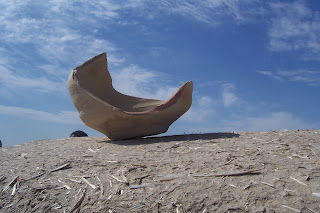The Aero Kassa or Howa Yollary brings the strongest volunteer to their knees. A trip to there creates that sick ball of dread that lodges uncomfortably under the diaphragm. It is a miraculous combination of every bureaucratic inefficiency, unnecessary obstacle, and waste of time. It is also the only (affordable) way out of the country.
The Aero kassa is the ticketing office for Turkmen Air. Turkmen Air is heavily subsidized, particularly internationally. For $500 or fewer volunteers—who pay local prices—have their choice of destinations: China, India, Thailand, England, UAE, Turkey, Russia, Kazakhstan, Kyrgyzstan, and even Mecca during the Hajj. The last one is not, of course, for infidels. We rationalize that the Aero Kassa is a necessary evil; it is the purgatory before paradise. Its only saving grace is the air conditioning.
I had my first experience there today. I bought my ticket to Turkey! I’m really going on vacation! And, while I’m delighted and excited now, the actual purchase was an ordeal. It began with the disruption of my master plan. The Aero kassa is first come, first serve, so I hoped to get there as the doors opened at 9. Unfortunately, my director needed to sign something for my grant. I told him I would meet him at 8 at the clinic. He rolled in at 10. This put a monkey wrench in my timing. I didn’t make it to the kassa until about ten past eleven. I was somewhere between 13 and 15 in line.
Like many developing nations—and even some developed ones—Turkmenistan has never fully grasped the queue. The ‘line’ in front of the international window was a jumbled mass of dyzas, students, Russians, and people planning to work abroad. Everyone is carrying large bags of money because you pay for the tickets, between 3 to 6 million manat, in cash. People are jostling, arguing, kidney punching, cutting, and describing—forcefully—where they belong in line. People wander in and out of line as the mood strikes, content that they will be able to return to their spot, behind the boy in the white shirt.
The line moves incredibly slowly. The tickets are written out by hand, each page stamped individually, and passport copied in triplicate. I stood, uncomfortably, for 2 hours, and that’s way below the record. I was afraid to get out of line because my queuing without a queue skills are sadly lacking. I met some nice people who yelled as people tried to cut in front of me.
I was handling it well, I thought. I wisely brought my iPod and even made a soothing and relaxing play list for the occasion. I brought a big book of Sudoku. I didn’t fidget overmuch, and I made every effort to be civil and courteous. When it was almost my turn at the window, only one man ahead of me, a dyza pushed her way to the front. She insisted that she had been here at 9; the boys she was behind, she said, had obviously left. She further explained that she had been waiting for three days for her ticket; broken computers thwarted her earlier attempts.
The line rallied around me, explaining that I had been there for two hours, that I was the nice visitor from America that I knew Turkmen, and that no one believed her story. The woman behind the window was annoyed and fed up with the disruption. I’m sure she was also a bit catty because it was almost lunchtime. The dyza sensed her cause was not being well received, so she moved to the next window…the manager’s window.
She began gesticulating and crying. She was sick! He son was a brilliant student in Turkey! She had been to the hospital, which was why she had left her place in line! The man counting the money recognized her! Her mascara smeared and ran down her cheeks in crocodile tear tracks. Low and behold, right as I’m placing my passport in the window, the manager demands that the dyza be helped first. Those were the 15 minutes when I was sure I was going to lose it. To be so close to victory and have to wait was brutal. I wanted to cry, even felt by eyes burn in frustration, but I kept it together.
I got my ticket at 1:45 and booked it to the café where I was meeting friends for lunch. I had intelligently called one of them and asked them to order food in advance. I stopped to get a coke because I needed a pick me up. I walked slowly, trying to release the tension in my lower back and balls of my feet and forget the whole experience. Despite the anger, bitterness, and frustration, I told myself, I had the power to leave. Just when I was making peace with the situation, I opened the door to the café and the first person I saw was that dyza. IRKSOME!!!!!!!!!!!!!!



